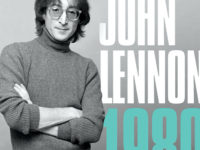Double Fantasy never felt dangerous enough to be a great John Lennon record. That started with this too-slick, of-its-moment presentation.
I guess it shouldn’t have come as too much of a surprise, really, since the best of Lennon’s solo stuff after 1970’s Plastic Ono Band similarly suffered from dated, shag-carpety production. He loved a big sound, when sometimes a smaller one would have been more effective. Early in John’s final decade, that meant pasting on herds of fiddles, a thudding drum clomp, gaggles of girl singers and these bawdy, burlesque saxophones. (A child of 1950s pop radio, John came by it honestly, I suppose.)
When Lennon returned to music making after a five-year hiatus with the November 1980 release of Double Fantasy, the ex-Beatle was still determinedly double-tracking his vocals, too. It afforded him a deeper, multi-layered sound but also needlessly softened the edges on one of rock music’s best sneers. Couple that with the compressed production values typically employed back then, and the resulting Double Fantasy — considered apart from his murder just weeks later — often ended up more gossamer than necessarily great.
John Lennon was, at his zenith, a scratched-and-dented treasure, laconic and all edge, and here he seemed to have settled into middle-aged domesticity — both figuratively and, by employing the prevailing pop veneer, literally. That’s perhaps why, at the time, I tended to favor a pair of loose, unfinished posthumous followups, 1983’s Milk and Honey and 1986’s Menlove Ave.
Not anymore. This 2010 edit of Double Fantasy — as telegraphed by its Stripped Down subtitle — claims the fertile middle ground between, fostering a fresh complexity in Lennon’s last studio work, even as it stays true to certain elements of the craftsmanship from before.
“(Just Like) Starting Over” begins with an organic vocal, bracingly upfront, and moves determinedly into an edgier update that deletes keyboards, echo and processing. John Lennon now stands in front of the song, nakedly hopeful and in no small way nostalgic. “This one’s for Gene and Eddie and Elvis — and Buddy!” Lennon enthuses, connecting more directly with the rockabilly greats who built this song’s infrastructure. You can almost picture Lennon, suddenly, in a happy-go-lucky oldies act like the Traveling Wilburys, had he lived.
That’s blown apart by the muscular “I’m Losing You,” which emerges with a sinewy new grit. This is still the most kinetic moment on Double Fantasy, as John looks back at his own alcohol-induced mid-1970s dumbassed-ness. We get an even deeper sense, now, of the return of Lennon’s muse — the vibrant, angry yang to his bread-making househusband yin. Similarly, “Clean Up Time,” one of the lesser-known tracks on Double Fantasy, shambles along with a greasy, heretofore undiscovered groove. Then there’s “Watching the Wheels,” the rare track on Double Fantasy: Stripped Down that sounds almost too bare at first — like a demo platform in need of a handyman’s touch.
The interesting thing, however, remains Lennon. He cops a hard-bitten stance that can’t swim to the top of the old version, which settled for a cozy, contemplative vibe.
Even when the new remix takes fewer chances, as on “Beautiful Boy (Darling Boy),” Lennon’s song to son Sean, there are moments of lasting, particular discovery. The song retains a lithe island feel but its peeled-back lyric goes deeper into familiar emotional places. Lennon somehow sounds even more blissfully content than he did at first, yet we can’t get away from the headlines that follow. There is no separating this album, even three decades later, from John’s fate. He’ll always be 40. John whispers “Good night, Sean, see you in the morning — bright and early,” and it’s like a cold hand closing around your heart.
The new album’s centerpiece is “Woman,” once this soaring, most obviously Beatlesque ballad, and now a bracing folk-tinged love letter. Torn down to two-by-fours and concrete, we see finally the blueprint of this cathedral in honor of marital bliss: Simple, undying love draws the lines. Everything else is window dressing. “Woman” still lives up to the original subtitle of Double Fantasy: A Heart Play.
It’s not all a revelation, of course. I haven’t stopped thinking that wife Yoko Ono’s more avant-garde contributions would have been better suited to their own album, rather than alternating with John Lennon’s work both here and on Milk and Honey. (While John was sometimes gingerly making his way back into the business, she was far more in sync with the prevailing post-punk zeitgeist.) And Lennon’s “Oh Yoko,” then as now, is a trifle.
Nevertheless, there is much to recommend in Double Fantasy: Stripped Down. With each layer of studio gimmickry that falls away, we hear more distinctly the way Lennon was beginning to come to terms with things — with middle age, with a settled life, with love and work and parenthood — and, as often was the case, long before his contemporaries. John Lennon, blessedly clearer of voice, begins to sound like a rebel again.
- Nick DeRiso’s Best of 2015 (Rock + Pop): Death Cab for Cutie, Joe Jackson, Toto + Others - January 18, 2016
- Nick DeRiso’s Best of 2015 (Blues, Jazz + R&B): Boz Scaggs, Gavin Harrison, Alabama Shakes - January 10, 2016
- Nick DeRiso’s Best of 2015 (Reissues + Live): John Oates, Led Zeppelin, Yes, Faces + others - January 7, 2016




This is a John & Yoko album, not a John solo album. Where's the rest of the review? You've had 30 years to catch up with John's appreciation of Yoko's work, so speed up.
A careful reading of the review shows that I too have an appreciation for Ono. I've simply never felt like her contributions meshed very well with Lennon's on "Double Fantasy" — and, well, it was John's 70th birthday and all.